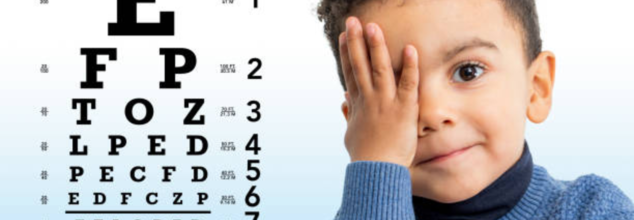- Health Conditions A-Z
- Health & Wellness
- Nutrition
- Fitness
- Health News
- Ayurveda
- Videos
- Medicine A-Z
- Parenting
- Web Stories
7 Clear Signs Your Child Might Need Glasses, Here's What Parents Should Watch For

Source: iStock
Watching my young niece squint at the television from across the room, I couldn't help but wonder if she might need glasses. Her struggle with distant objects made me reflect on how easily vision issues can go unnoticed in children. Ensuring our children’s eye health is crucial, yet many parents might not realize the signs that indicate their child needs glasses. Early detection can make a significant difference in their visual development and overall quality of life.
Recognizing when a child needs glasses can be challenging, as children often cannot articulate their vision problems clearly. However, being aware of certain behavioral cues can be incredibly helpful. Common indicators include squinting, rubbing the eyes frequently, and having trouble with distance vision. These signs can suggest that a child is struggling with their eyesight and may require an eye examination.
Signs That Your Child Needs Glasses
Several key signs can signal that a child might need glasses. According to health experts, one of the most noticeable signs is difficulty seeing objects clearly from a distance. If your child frequently complains about not being able to see the board at school or seems to have trouble reading signs or book text, it might be time to consider an eye exam.Here are key signs that your child might need glasses:
1. Squinting: If your child frequently squints to see distant objects or when trying to focus, it may indicate they have trouble seeing clearly.
2. Frequent Eye Rubbing: Rubbing their eyes often could suggest eye strain or discomfort, which might be a sign of vision problems.
3. Complaints of Headaches: Persistent headaches can be a result of eye strain from struggling to focus, potentially signaling the need for glasses.
4. Difficulty Seeing Objects at a Distance: If your child has trouble reading the board at school or seeing signs from afar, their vision might be compromised.
5. Close Proximity to Reading Materials: Holding books or screens unusually close to their eyes can indicate difficulty with near vision.
6. Frequent Complaints About Eye Discomfort: Any regular complaints about itching, burning, or general discomfort in the eyes could be related to vision issues.
7. Problems with Eye Coordination: Difficulty with tasks that require eye-hand coordination, like catching a ball or reading, might suggest a vision problem.
Smart Suggestions for Parents To Watch For
For parents, the key to managing your child's eye health is vigilance and proactive care. Schedule regular eye exams, ideally starting by the age of three, and ensure your child has their vision checked if they exhibit any signs of discomfort or visual difficulty. Early intervention can help address potential issues before they affect your child’s learning and development.
Encourage good visual habits, such as taking breaks from screens and ensuring adequate lighting when reading or doing homework. If glasses are prescribed, make sure your child wears them consistently to prevent further strain and to help them adapt to their new visual aids more quickly.
Katrina Kaif’s Pregnancy Sparks Spotlight on Late Motherhood Trends

Credits: Instagram
Katrina Kaif and Vicky Kaushal are set to welcome their first child. They have shared a photo where Katrina is flaunting her baby bump on her Instagram.
She is 42 and her choice also mirrors a growing trend among urban Indian women who are embracing motherhood later in life, often after focusing on education, careers, and financial independence. In fact, late pregnancies have become increasingly common in recent years. Deepika Padukone, for example, welcomed her daughter on September 8, 2024, at the age of 38, joining a growing number of public figures who are redefining the timeline of motherhood.
Late Pregnancy: How Healthy Is It?
The National Institute of Health (NIH), US (2022), 20% of women in the US are now having their first child after the age of 35. While it is the new trend, the NIH doctor Dr Alan Decherney, a fertility expert explains that "As women age, they are still fertile, but their odds of pregnancy are decreased because they are not making as many good eggs that will fertile and divide normally and turn out to be an embryo."
ALSO READ: Women Are Now Waiting More Before Becoming A Mother, Age Trend Shows Motherhood From 2016 to 2023
Is Getting Pregnant More Difficult After 30?
After age 30, a woman's fertility decreases ever year, notes the NIH July 2022 issue. It notes: "The number and quality of her eggs goes down until she reaches menopause."
However, experts do point out that getting pregnant in your 30s need not be a stressful affair at all times. As it is at this age when you experience more stability, and also someone you know who have a personal experience in handling one. Most important, you are more mature at this age, which you may not be in your 20s.
Are You Planning Your Pregnancy After 30s? Here's How To Do It Right
Quit Habits: If you are a smoker, or consume alcohol, this is a good time to leave it.
Reduce Stress: While pregnancy for some can bring stress, try to find activities that help you release it.
Healthy Weight: Ensure that your weight is right, reduce your waist to bring it to a healthy range for a healthy pregnancy.
Food Habits: Stop eating junk and start eating more whole grains.
Exercise: A sedentary lifestyle can impact negatively on the child. You do not have to do HIIT, however, regular easy workouts can make both the pregnancy and delivery easy.
What Women In Their 30s Should Be Ready For During Pregnancy?
Dr Michelle Y Owens, professor of obstetrics and gynecology and a practicing maternal-fetal medicine specialist at the University of Mississippi Medical Center in Jackson, writes for the American College of Obstetricians and Gynecologists (ACOG) that "the longer your eggs have been around, the more likely they are to produce a pregnancy with a chromosome problem that can lead to a condition like Down syndrome. The risk goes up significantly after 35."
However, she says, there is a good news. Now, we have tools to detect and respond to pregnancy complications early.
After Tylenol And Autism Link, Who Should Parents Trust?

Credits: AP
"Don't take Tylenol if you're pregnant, and don't give Tylenol to your child," said President Donald Trump in a White House briefing as a result of which many Americans would pull out acetaminophen from their medicine cabinet. While science does not back the claim of acetaminophen causing childhood autism if pregnant mothers consume it, however, the Trump administration has blamed it to cause the rise in autism cases in the recent years.
In such a case, what must the parents do? Who can they rely on?
Helen Tager-Flusberg, director of Boston University's Center for Autism Research Excellence told NPR, "Are thy [parents] going to listen to people who are not physicians, who have no expertise in autism, or are they going to turn to their medical providers, their treatment providers and ask them what their view of the current science is? That's what they should be doing."
However, the truth of the matter is that parents are in fact worried and are wondering what decision must they take. Brian Lee of Drexel University, and one of the authors of the studies on acetaminophen told NPR in an interview rightly points out that while it is important to rely on science, "Who has time to sit there and go through the dozens or hundreds of scientific articles on any given topic?"
So, what is the solution? Lee says, it is to trust medical experts. "We trust our experts. And if our experts are telling us one thing, but other experts are saying another thing, it causes confusion."
Read: Trump's Claim On Linking Tylenol And Autism Is Unscientific, According To Doctors
Nicole Baldwin, MD, a pediatrician from Cincinnati, Ohio, told NPR that any association that's been seen between autism and acetaminophen in studies doesn't necessarily mean there's a causal relationship. The comparison Baldwin provides is of the shark attacks in the summer and eating ice cream in the same season. "But that doesn't mean that one causes the other," she says.
"These studies that have been out show correlation, but don't actually show causation," says Baldwin." "And I think that's an important thing for parents to realize — that the science is not known just yet, despite what has been said."
Why Is President's Announcement On Tylenol Worrying?
While many might argue that one can just avoid Tylenol altogether in pregnancy and "tough it out" like Trump suggested, however, experts in maternal-fetal medicine say that untreated fever is known to be dangerous in pregnancy, and pain is also a problem. So, Trump's repeated comment that there was "no downside" to not taking acetaminophen does not necessarily stand correct.
The Society for Maternal-Fetal Medicine pointed out that "untreated fever, particularly in the first trimester, increases the risk of miscarriage, birth defects, and premature birth."
In fact, Baldwin noted that when she was pregnant with her daughter, she had ab mild injury. "And if I hadn't had Tylenol to take, I can't imagine the suffering I would have had for two months," she says.
The problem is that there are no other medications that pregnant women can take, this is because other pain and fever reducing drugs have been proven unsafe in pregnancy. For instance, another popular drug, ibuprofen, has been linked to kidney problems in fetuses.
Childhood Obesity Raise Alarm In Indiana: Rates Have Increased By 83%, What Problems Are Children Facing Due To It

(Credit-Canva)
While recent research has shown that children with obesity rates have been rising, a new report showed exactly how fast and high the rates have become within the span of a few years.
September is National Childhood Obesity Awareness Month, and new data from the Indiana Youth Institute (IYI) and Jump IN for Healthy Kids shows a troubling trend. The report highlights that one in five children in Indiana, aged 2 to 19, are living with obesity.
This is a significant problem with wide-ranging consequences. The most alarming finding is a dramatic 83% increase in obesity among children ages 2 to 5 between 2014 and 2023, with much of this rise happening during the pandemic.
Childhood obesity has been linked with numerous health problems, whether it is decrease in the quality of life or even premature death according to HPI (Health Policy institute). It has also been named as a risk factor of the 4 leading causes of death in the US, which are coronary heart disease, type-2 diabetes, stroke and cancer.
How Is Obesity Affecting Children
One Childhood obesity isn't just a matter of weight. It deeply impacts a child's overall well-being.
Physical Health
Kids with obesity are at a much higher risk of developing serious medical conditions. This includes type 2 diabetes, high blood pressure, and orthopedic issues caused by the extra weight on their growing bones and joints. These problems can follow them into adulthood, leading to chronic diseases.
Emotional and Social Well-being
The struggle with obesity can also affect a child's mental state. They may experience low self-esteem and anxiety, which can cause them to feel insecure and withdraw from social activities. This may lead to them skipping school or avoiding extracurricular activities they might otherwise enjoy.
Economic Impact
There are also significant financial costs. A child with obesity is estimated to have $19,000 more in lifetime medical costs than a child who is at a healthy weight. This places a financial burden on families and the healthcare system.
What's Causing This and What Can We Do?
Several factors contribute to childhood obesity, including genetics, access to healthy food, opportunities for physical activity, and neighborhood safety. HPI explains that obesity is linked with physical inactivity. Two factors that caused it were over-reliance on electronics for entertainment and decreased participation in physical education programs in school
Economic challenges can also push families toward less expensive, highly processed foods instead of fresh, nutritious options. This makes it harder for them to maintain a healthy diet, even when they know it's important. The good news is that solutions are within reach. It's a complex problem that requires a combined effort from everyone.
- Families can start by setting good examples. This means eating nutritious meals together and limiting the amount of time spent in front of screens.
- Schools can help by making sure children get daily physical activity and have access to healthy meal options during the school day.
- Policymakers and community groups can work on a larger scale by improving access to affordable, healthy food and creating safe places for kids to play and be active.
The key is to work together without blame or shame. As Tami Silverman of the IYI says, it’s about taking practical steps as a community to create lasting change for our kids.
© 2024 Bennett, Coleman & Company Limited

